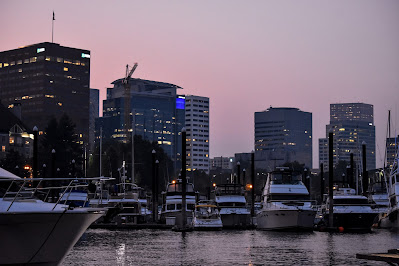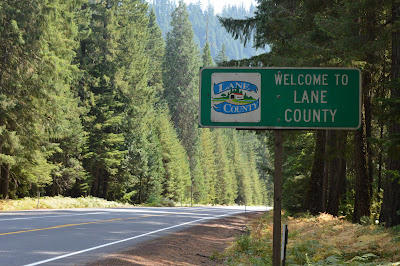Oregon Prayer Spotlight: Portland Part - 2
At the beginning of the twentieth century terms such as “most dangerous port,” (in the west, the country, the world) were used about Portland, as well as “wide open.” The police customarily fined illicit businesses such as gambling houses, brothels, and opium dens, but otherwise left them alone.
However, there were other forces at work in Portland in the early years of the twentieth century. We can touch on some of them.
The Lewis and Clark Centennial and American Pacific Exposition and Oriental Fair, which had been in the planning stages for several years, took place June 1 to October 15thof 1905. The city merchants and the state government had cooperated to produce what amounted to a world’s fair to showcase Oregon. The preparation for this event improved the infrastructure of the city and boosted the regional economy. It also was instrumental in increasing the population of Portland from around 120,000 in 1905, to over 200,000 just five years later. It was a turning point for Portland and had long-lasting effects, including the start of the Rose Festival, expanded public transportation, and the introduction of apartment buildings as the population boomed.
Another factor at work in Portland was a movement termed in history books as “The Progressive Era.” The period from about 1896 – 1916 was known for its reformers who were taking a hard look at many areas of culture and society. Middle-class women were heavily involved, as were Christian ministers, and they tackled corrupt political machines and their bosses, broke up monopolies, worked to improve working conditions, outlaw child labor and get women the vote. They succeeded in getting prohibition passed and inspired the term “muckraker” for their efforts to expose corruption and injustice.
 |
| Foreign Exhibits Building Lewis and Clark Exhibition 1905 |
The reform movement came to Oregon as well. In fact, Oregon passed both women’s suffrage and prohibition well before the rest of the nation.
While the police had simply fined illicit businesses, in 1904 a new sheriff came to town. Tom M.Word was elected as Multnomah County sheriff running as a “prohibition Democrat and anti-vice zealot” according to Barney Blalock in The Oregon Shanghaiers.
He was the sort of man who was known to have jumped out of his carriage on Third Street just because he caught a whiff of opium smoke and traced it to its source and arrested several stunned inhabitants of a hithertofore unharassed den.
~The Oregon Shanghaiers
A year after Sheriff Word took office, the city elected another anti-vice reformer, Harry Lane, as mayor. Harry Lane was the grandson of Joseph Lane, the first territorial governor of Oregon and the person for whom Lane County was named.
Mayor Harry Lane did not subscribe to the notion that the city was best served by a system of regular fines levied on places where illicit activities were carried out. He was elected as a reformer.…He set the night of October 5, 1908, as the date the red lights would go out [in North Portland].…This night changed the district called “Whitechapel,” or the “Bad Lands,” forever. There would continue to be prostitution in the city, but the “red light district” would never return to the North End.
~The Oregon Shagnhaiers
Tom Word spent another term as Multnomah County sheriff in 1913-16 and went on to become a United States Special Agent. Harry Lane held two terms as mayor and was later elected to the U.S. Senate.
Portland was booming under the inspiration of the exposition; reformers were cleaning up the town, but there was another force at work. 1904-05 was the start of what is usually called the “Welsh Revival,” birthed during an intense time of prayer, repentance and rededication in Wales (and elsewhere). It spread worldwide. Some credit Welsh immigrants in Pennsylvania with lighting the revival fires here, but however it happened, prayer meetings, evangelistic preaching, salvations and church growth were occurring all over the country, including “wide open” Portland.
The March 12, 1905 edition of the Sunday Oregonianran a half page account of the plans for a series of revival meetings to be held in Portland beginning March 22nd. The organizer of this effort was Dr. J. Wilbur Chapman, a well-known Presbyterian minister who had worked with Dwight L. Moody in the 1890’s. Around 1900 Dr. Chapman developed a new system for evangelistic services, organizing a large team of ministers and holding simultaneous meetings. The Oregonian reported that he had an evangelist and singers for each of nine Portland districts. Over a hundred churches were involved, a thousand choir members had been recruited, and hundreds of homes were holding cottage prayer meetings.
J. Edwin Orr, researcher into the history of religious revivals, wrote about the revival of 1905 in The Flaming Tongue:
One report from Portland, Oregon, describes the deep incursions of “religious enthusiasm” (revival) not only into the church and hearts of individual Christians but into the very fabric of the everyday life of the culture.
He also reported that two hundred major stores agreed “in writing” to close from 11 to 2 every day to allow customers and employees to attend prayer services.
What took place in Portland in 1905 and the years following? Portland became a more prosperous, and more wholesome town. Prayer and church attendance were in vogue and various forms of vice drastically reduced - “religious enthusiasm” influencing “the everyday life of the culture.” As a believer in the power of prayer, I have to admit I believe that all those “cottage prayer meetings” had some influence. The Lord was pouring out His Spirit worldwide, and it touched Portland.
How do we pray for Portland? If my people, who are called by my name, will humble themselves and pray and seek my face and turn from their wicked ways, then I will hear from heaven, and I will forgive their sin and will heal their land. II Chronicles 7:14
Continue to pray for Portland: it’s working.
Next: the enemy, while a defeated foe, does not take encroaches into his territory lightly. By 1916 the world was at war and well-intentioned prohibition in Oregon began to usher in a new era of corruption and crime.
Margaret




Comments
Post a Comment